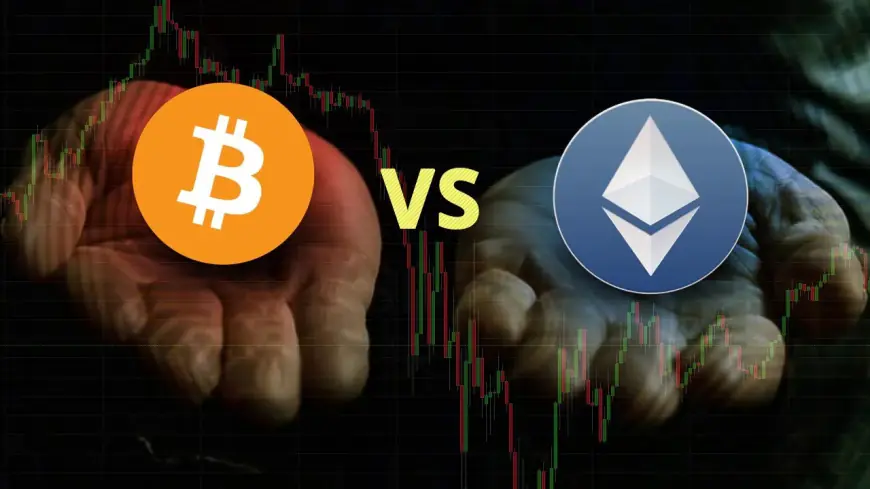Bitcoin vs Ethereum: Which is the Better Investment in 2024?
Bitcoin and Ethereum are the two largest cryptocurrencies, but which is the better investment in 2024? This article provides a detailed comparison of Bitcoin vs Ethereum, examining their use cases, performance, consensus mechanisms, and investment potential to help investors make informed decisions.

As two of the largest and most well-known cryptocurrencies in the market, Bitcoin (BTC) and Ethereum (ETH) have long been considered the top contenders for crypto investors. Both have seen tremendous growth since their inception, but they serve different purposes and operate on distinct technologies. In 2024, the debate between Bitcoin and Ethereum continues to evolve as both ecosystems expand and mature.
In this article, we’ll take an in-depth look at Bitcoin vs Ethereum, comparing their use cases, performance, and future potential to help you determine which cryptocurrency might be the better investment for you in 2024.
Understanding Bitcoin: The Original Cryptocurrency
Bitcoin was the first cryptocurrency, created by an anonymous entity known as Satoshi Nakamoto in 2009. Its primary function is to serve as a decentralized digital currency, enabling peer-to-peer transactions without the need for intermediaries like banks. Bitcoin has gained widespread adoption as a store of value, often referred to as "digital gold." Its fixed supply of 21 million coins ensures scarcity, which has contributed to its appeal as an inflation hedge and long-term investment.
Some key features of Bitcoin include:
- Store of Value: Bitcoin is often compared to gold as it has a fixed supply, which makes it a popular hedge against inflation.
- Security: Bitcoin’s proof-of-work (PoW) consensus mechanism makes it highly secure, but it is also energy-intensive.
- Limited Supply: There will only ever be 21 million BTC in circulation, which creates scarcity and could drive up value over time.
- Widespread Adoption: Bitcoin has the largest market capitalization of any cryptocurrency and is accepted by many merchants, companies, and even some governments.
Understanding Ethereum: The Smart Contract Platform
Launched in 2015 by Vitalik Buterin, Ethereum is more than just a cryptocurrency; it’s a decentralized platform that enables developers to build decentralized applications (dApps) and execute smart contracts. While ETH, the native currency of the Ethereum network, is often compared to Bitcoin, Ethereum's use cases extend far beyond simple transactions. Its programmable blockchain allows for complex applications in finance, gaming, art (NFTs), and much more.
Some key features of Ethereum include:
- Smart Contracts: Ethereum introduced smart contracts, self-executing contracts with the terms of the agreement directly written into code, which revolutionized the blockchain space.
- dApps Ecosystem: Ethereum is the leading platform for decentralized applications (dApps), powering DeFi, NFTs, and other blockchain-based innovations.
- Transition to Proof of Stake (PoS): With the Ethereum 2.0 upgrade, Ethereum has moved to a proof-of-stake consensus mechanism, reducing its energy consumption by over 99% compared to proof of work.
- Scalability: Ethereum 2.0 and Layer 2 scaling solutions aim to make the network faster and more efficient, increasing its capacity to process transactions and host applications.
Bitcoin vs Ethereum: Key Differences
While both Bitcoin and Ethereum are built on blockchain technology, they serve different purposes and have distinct features that set them apart. Let’s explore the key differences between the two:
1. Purpose
Bitcoin: Primarily a digital currency and store of value. Its main goal is to provide a decentralized alternative to traditional currencies, often used as a hedge against inflation and economic instability.
Ethereum: A platform for decentralized applications and smart contracts. While ETH can be used as a digital currency, its primary purpose is to power applications built on the Ethereum network, making it more of a utility token.
2. Consensus Mechanism
Bitcoin: Bitcoin uses the proof-of-work (PoW) consensus mechanism, which requires miners to solve complex mathematical puzzles to validate transactions. This makes Bitcoin highly secure but energy-intensive.
Ethereum: Ethereum transitioned from PoW to proof of stake (PoS) in 2022 with the Ethereum 2.0 upgrade. PoS is more energy-efficient and allows for faster transaction processing.
3. Supply
Bitcoin: Bitcoin has a capped supply of 21 million coins, which creates scarcity and increases its value proposition as a store of value. As of 2024, over 19 million BTC have already been mined.
Ethereum: Ethereum does not have a fixed supply, but its annual issuance rate has been reduced significantly with Ethereum 2.0 and the introduction of Ethereum Improvement Proposal (EIP) 1559, which burns a portion of transaction fees, reducing overall supply inflation.
4. Use Cases
Bitcoin: Bitcoin’s primary use case is as a store of value and medium of exchange. Its simplicity and limited features compared to Ethereum make it an attractive investment for those seeking long-term wealth preservation.
Ethereum: Ethereum’s flexibility makes it the foundation for a wide range of applications, from decentralized finance (DeFi) platforms to non-fungible tokens (NFTs). Its programmable blockchain enables innovations far beyond simple transactions.
5. Transaction Speed and Fees
Bitcoin: Bitcoin’s network processes about 7 transactions per second (TPS), with transaction fees fluctuating based on network congestion. Fees can be relatively high during periods of high demand.
Ethereum: Ethereum can process around 30 TPS, with Layer 2 solutions like Optimism and Arbitrum aiming to increase that number. While Ethereum gas fees have been notorious for being high, Ethereum 2.0 and Layer 2 scaling solutions are working to reduce them.
Bitcoin vs Ethereum: Investment Potential in 2024
Bitcoin’s Investment Outlook
Bitcoin continues to dominate the crypto market in terms of market capitalization, and its role as "digital gold" remains a strong investment thesis. As central banks around the world print more money and inflation concerns grow, Bitcoin’s fixed supply makes it an attractive hedge against inflation.
In 2024, Bitcoin could see further institutional adoption, particularly as financial institutions, governments, and even large corporations continue to explore Bitcoin as part of their investment strategies. The approval of Bitcoin ETFs in various markets has also boosted confidence in the asset.
However, Bitcoin’s lack of utility beyond being a store of value could limit its long-term growth compared to more versatile platforms like Ethereum. Nonetheless, for investors seeking a conservative, long-term store of value, Bitcoin remains a compelling choice.
Ethereum’s Investment Outlook
Ethereum’s potential lies in its versatility and the growing adoption of decentralized applications (dApps), smart contracts, and decentralized finance (DeFi). Ethereum’s ecosystem is vast, and with the continued rollout of Ethereum 2.0, scalability issues are being addressed, making the network more efficient and user-friendly.
The rise of NFTs, DeFi, and Web 3.0 has solidified Ethereum’s position as the leading platform for blockchain innovation. In 2024, Ethereum is expected to continue growing as new Layer 2 solutions and dApps attract more developers and users. The platform’s ability to adapt and evolve makes it a strong contender for investors seeking exposure to the broader blockchain ecosystem.
While Ethereum’s value may be more volatile than Bitcoin’s, its expanding use cases and potential for mass adoption make it an attractive investment for those with a higher risk tolerance and long-term vision.
Which Is the Better Investment in 2024?
Ultimately, choosing between Bitcoin and Ethereum depends on your investment goals, risk tolerance, and belief in the future of blockchain technology.
- Bitcoin: May be the better choice for those looking for a store of value, inflation hedge, and long-term wealth preservation. Its fixed supply and widespread adoption as a digital currency make it a safer, albeit more conservative, investment.
- Ethereum: Offers greater growth potential due to its wide-ranging use cases and ongoing technological advancements. Its role in powering DeFi, NFTs, and the broader dApp ecosystem gives it a unique edge, but it comes with more volatility and risk.
Conclusion
In conclusion, Bitcoin and Ethereum both offer unique investment opportunities in 2024. Bitcoin remains the premier store of value, with its limited supply and strong adoption as "digital gold." For investors seeking a more stable and established asset, Bitcoin provides a secure hedge against inflation and economic uncertainty.
On the other hand, Ethereum's potential lies in its expansive ecosystem of decentralized applications, smart contracts, and DeFi. As Ethereum 2.0 continues to improve scalability and efficiency, the network is poised for significant growth, making it an attractive choice for investors with a higher risk tolerance and a focus on the future of blockchain technology.
Ultimately, the decision between Bitcoin and Ethereum should be based on your individual investment strategy, risk appetite, and long-term goals. Both assets offer distinct advantages, and diversifying across both could help you capture the benefits of both stability and innovation in the rapidly evolving world of cryptocurrencies.
What's Your Reaction?




















